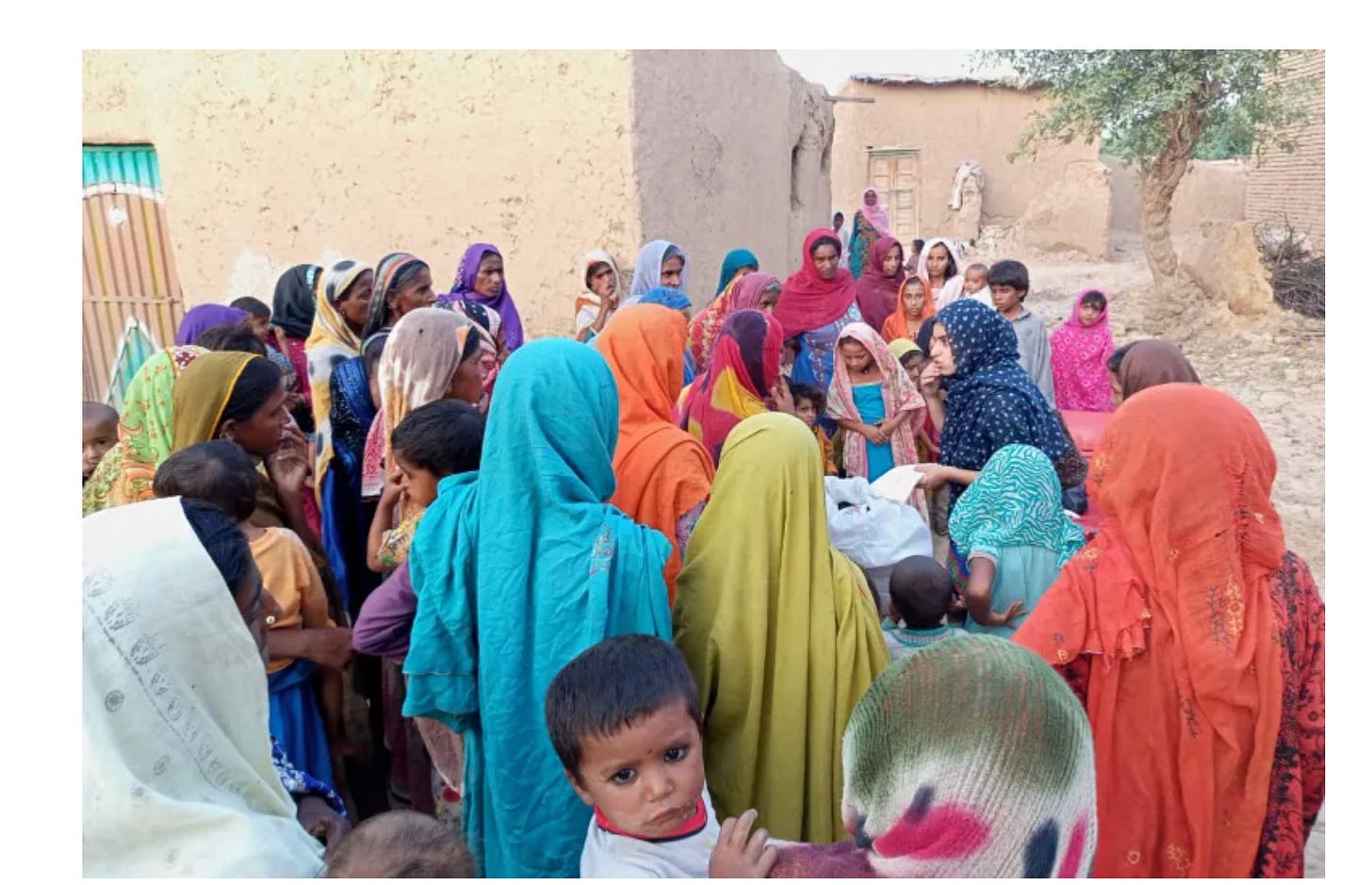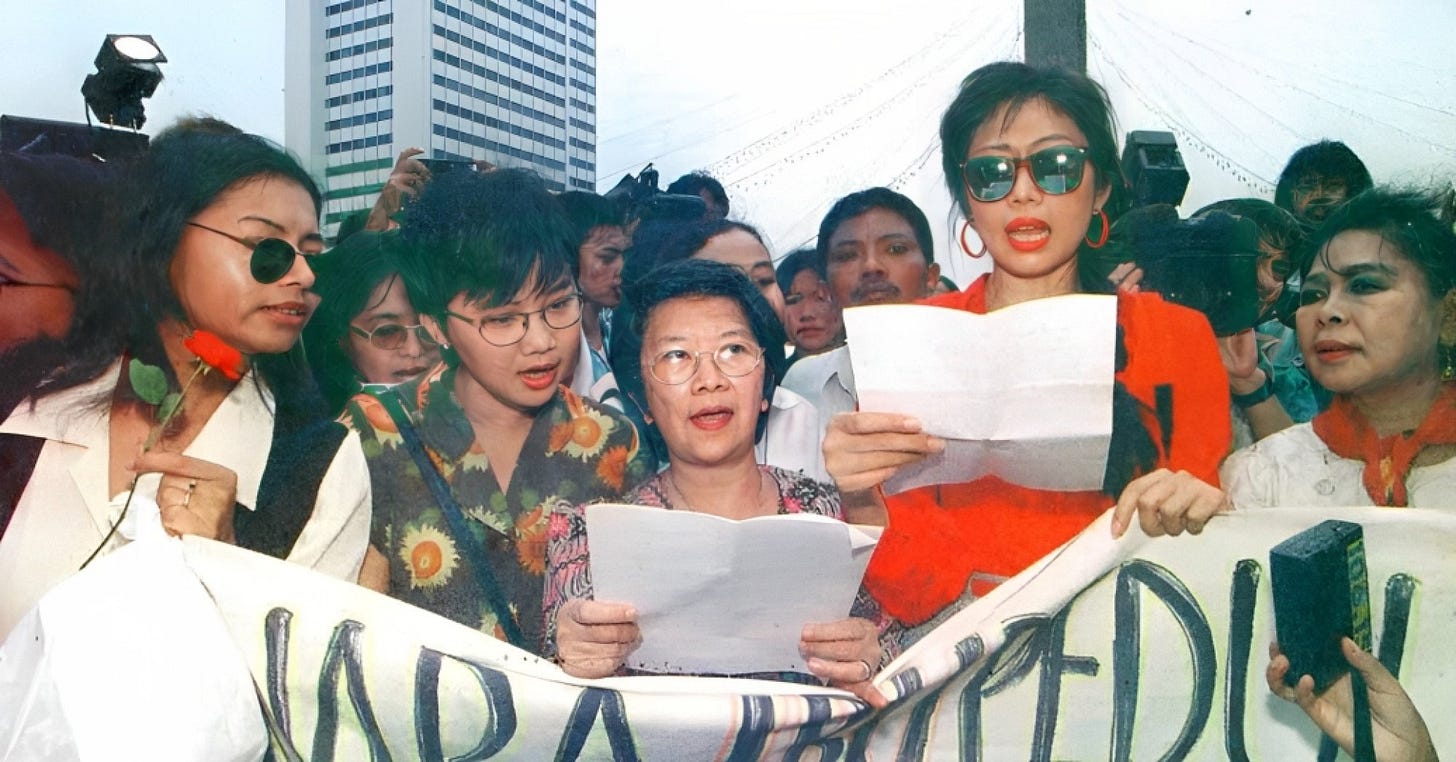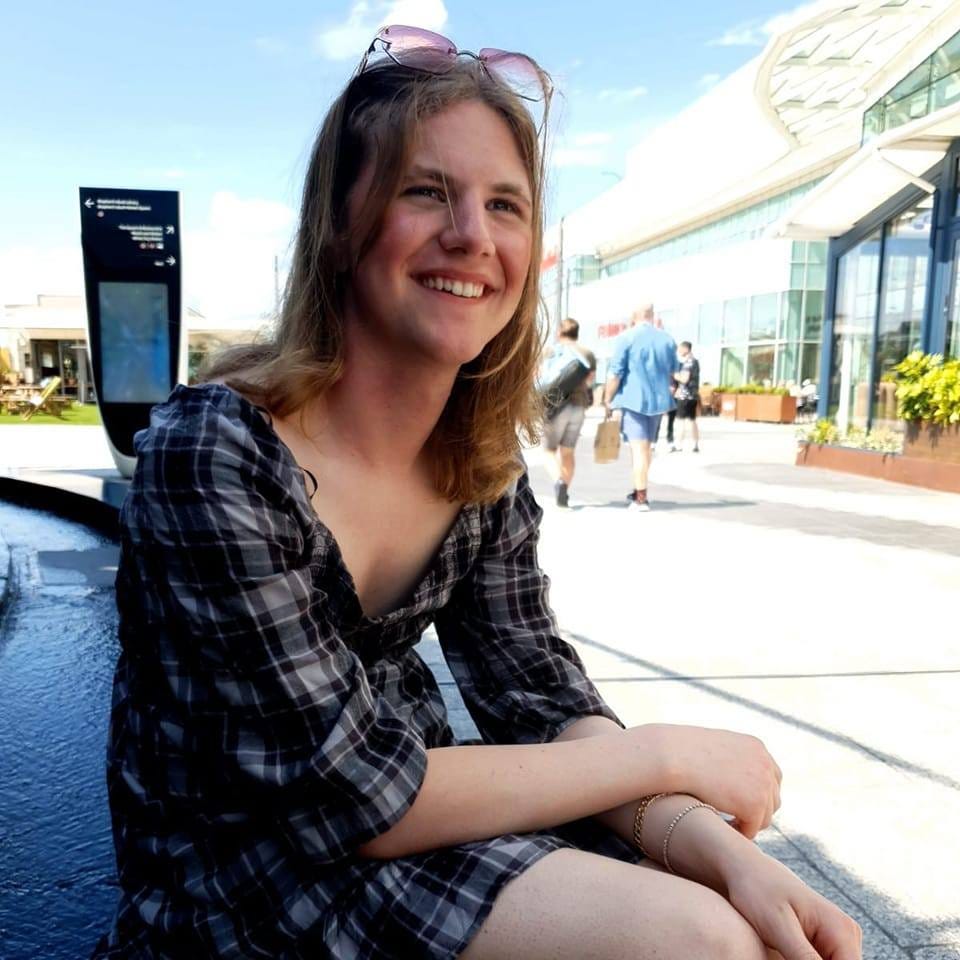Global Roundup: Pakistan Menstrual Awareness Activists, Indonesian Feminist on May 1998 Riots, Morocco First Gay Writer, Belfast Trans Woman, Young Woman Tackling Mental Health Crisis
Curated by FG Contributor Samiha Hossain
Bushra Mahnoor of Mahwari Justice works with flood affected communities in Foleji, Balochistan, in October 2022 [Coutesy of Mahwari Justice]
More than 33 million people were affected by torrential rains and flash floods in Pakistan last summer– that’s one in seven Pakistanis. Anum Khalid, a 24-year-old university student, posted a message at the time on Facebook asking for help in gathering period products. She shortly received a reply from Bushra Mahnoor, a 22-year-old student at another university, who wanted to work with her. Bushra and Anum decided to set up a group to appeal for menstrual hygiene supplies like pads and underwear. They packed the supplies and coordinated with local aid groups to get the kits to the women in Sindh and Balochistan, provinces worst hit by the floods. They named the group “Mahwari Justice” – “mahwari” means menstruation in Urdu – and made a GoFundMe page and Twitter account. When they contacted men coordinating relief efforts in both provinces, the men often said they didn’t want to engage in this type of work.
In the past, Anum had worked with the trans community as an activist. Now, trans activists reached out to her and offered a space for Mahwari Justice to do their work and store donations. Members of the trans community joined local volunteers to pack kits. Through midwives and doctors travelling to the affected areas, and local contacts coordinating small-scale relief work, Bushra and Anum sent hygiene kits with pads, underwear, soap and detergent to 3,000 women in Balochistan within a few weeks.
In order to understand the needs of rural women, Bushra and Anum spoke with relief workers and gynaecologists, as well as the affected women themselves. To counter criticism that women wouldn’t know how to use pads, they created a printed infographic explaining how to use and dispose of pads and added it to each kit. Eventually, they created four types of kits based on conversations with women in the affected areas.
I never thought that I, a young woman in a university dorm in a major city, would understand what a woman affected by the floods in rural Sindh might want. -Bushra Mahnoor
Bushra and Anum quickly became the target of criticism and anger on social media as their appeals for donations were shared widely and they were featured on international media outlets. People were angry they were focusing on menstrual health, many saying that food and shelter should be the priority. One of Anum’s thesis supervisors, who was also a doctor, was dismissive, asking what was the need to do such work. Bushra’s mother said she would be responsible if her sisters didn’t get good marriage proposals in the future. Anum’s mother insisted that they change the name of their organisation and threatened to kick her out of the house if they didn’t.
I felt really isolated. There was the backlash from society and our own families did not support us. Our sisterhood is what sustained us. -Bushra Mahnoor
The backlash faced by Bushra and Anum is unfortunately the norm for those working in promoting women’s sexual and reproductive health. Nonetheless, women continue to persist and challenge patriarchal and misogynistic tradition. Other important initiatives in Pakistan such as HER Pakistan, Raaji and Aurat Raaj are covered in the article.
Julia Suryakusuma (in red) at a women’s rally in 1998
After 32 years of rule by military dictator Suharto, Indonesians violently rose up to protest against food shortages, mass unemployment, corruption and the economic crisis, and the minority Chinese community – long targeted by discriminatory policies and blamed for stealing jobs – came under attack.
Ita Fatia Nadia, from the Volunteers for Victims of Sexual Violence Against Women, said there were 152 instances of sexual violence that year against Indonesian-Chinese women in Jakarta and its surrounding regions, between May 12 and June 2. But the actual number could be much higher nationally, since rioting also broke out in other major cities across Indonesia, Suryakusuma said.
Not all the victims chose to come forward. The shame, humiliation and total loss of self-worth and dignity very often cause rape victims to bury the recollections of horror and trauma. -Julia Suryakusuma
Suryakusuma was one of some 100 female activists from the Women’s Coalition for Justice and Democracy who protested outside the Ministry of Defence on July 17, 1998. The protesters were denied their request for an audience with General Wiranto, the Minister of Defence and Commander of the Indonesian Armed Forces at that time, but they were allowed to submit a petition seeking to hold the military accountable for its role in the May riots.
But the tragedy also became a catalyst for change, Suryakusuma said, unifying and galvanizing women’s rights groups that had been polarised along “secular” and “Muslim” lines. In the same year after the riots, Indonesia also established the National Commission on Violence against Women (KOMNAS Perempuan) to work with and advise the government on combatting gender-based violence.
Earlier this year, President Joko Widodo formally “acknowledged” the May 1998 riots, along with 11 other incidents, to be a “gross violation of human rights” for which he also expressed “regret”. But Suryakusuma and civil society groups are not satisfied and demand concrete steps towards reconciliation as well as explicitly mentioning the sexual violence that took place. Suryakusuma said feminism in the country today faces considerable challenges, as Indonesians increasingly move towards religious conservatism.
Feminism has, to a certain degree, become a dirty word. Sometimes labelling ourselves as feminists can lead to a backlash, though it’s too late for me to change mine. -Julia Suryakusuma
Taïa has published numerous novels, often with a semi-autobiographical element. He also produced a film, Salvation Army, that details the complexity of being gay in Muslim societies of Morocco. His work challenges the culture of discretion and silence on queer-related issues in north Africa and the broader Muslim world. Although his work has received critical acclaim and awards internationally, this has not been the case in his home country.
Taïa’s novels demonstrate that Muslim cultures and Islamic traditions are not inherently homophobic. Rather, Muslim social spaces are portrayed as promoting physical closeness and contact between bodies. In Infidels, he describes how the space of the hammam, or steam baths, is at once homosocial, intimate and erotic. During his first visit to a hammam, the narrator is surprised by how men showed off their virility. He sees men “in a new light: fragile, sensitive, handsome, and open to all experiences”.
Taïa is able to reimagine Islam within the religion itself and the authors of the article call this a “restorative and liberatory process”. They admit that some queer African Muslims experience considerable levels of religiously motivated queerphobia. However, they emphasize “the importance of creative and literary writing as a tool for representing, critiquing and reimagining religious realities and their impact on everyday lived experiences”.
Coming out as transgender in today’s political environment was not an easy decision. For months I tossed the decision around in my head. Who can I tell? When do I tell them? Will they still love me? These questions are unfortunately normal for most transgender people. -Caitlin
Caitlin discusses her journey growing up and how she had a supportive group of friends who accepted her identity when she came out. However, she calls self-acceptance a challenge amid the current political and media attacks on the trans community. She mentions how in recent months political commentators have called for the ‘eradication’ of trans people and formerly progressive parties like Labour have changed their positions to be against trans women. Given the situation, it is important for Caitlin to assert her identity and highlight how it has allowed her to seek out life-saving medical treatment and gain confidence in her true self.
Why do I write this? Well, as attacks on trans people continue to rise it is important to highlight our experience. I am a human being just trying to navigate this maze we call life. I am a university student, a daughter, and a friend. Being myself now gives me the ability to walk the streets with confidence and introduce myself to others with pride. I am me. I am trans. I am beautiful. -Caitlin
LORS PHOTOGRAPHY / DESIGN BY YOORA KIM
A couple of years ago, Etasha’s close friend died by suicide and she was confronted with a powerful, albeit difficult, question she knew she had to find an answer to: “How can I build something that can make a positive impact within the mental health space, and potentially save lives?”
I've come to realize that many people use [social media] as a platform to express their mental health struggles and emotions. However, amid the vast sea of posts, these expressions often go unnoticed. -Etasha Donthi
In between prom prep, midterm exams, and college applications, Etasha taught herself how to code via online research, YouTube, and female-led STEM organizations such as the Karlie Kloss-founded Kode With Klossy program. Now a high school senior, Etasha has developed Livity, a patent-pending novel algorithm that has the ability to identify suicidal ideation and mental health struggles within posts uploaded to apps like Twitter and Reddit, and then, connect those individuals with free mental health resources. In 2021, she also founded She The Change, a podcast and non-profit organization that highlights female leaders and changemakers who are challenging and changing the status quo in male-dominated fields.
After graduation, Etasha will study engineering in university. Her mission remains to amplify gender equity and be a force of change that only grows stronger. It’s important for her to see herself represented in the field of STEM as a woman of color. She shares some valuable advice for younger women in the field of STEM:
Your voice matters. You matter. Have faith in yourself. Imposter syndrome is an incredibly real feeling, but realize that you are not alone. Finding a sense of community and realizing that there are other people just like you, who are experiencing inequity within these male-dominated spaces, helps you realize that you belong and your voice matters. -Etasha Donthi
Samiha Hossain (she/her) is a student at the University of Ottawa. She has experience working with survivors of sexual violence in her community, as well as conducting research on gender-based violence. A lot of her time is spent learning about and critically engaging with intersectional feminism, transformative justice and disability justice.
Samiha firmly believes in the power of connecting with people and listening to their stories to create solidarity and heal as a community. She refuses to let anyone thwart her imagination when it comes to envisioning a radically different future full of care webs, nurturance and collective liberation.






